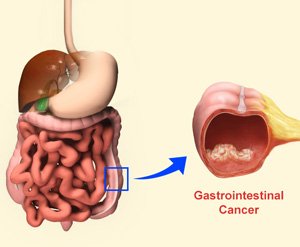
effect on body part
- Digestive tract damage
- Obstruction
- Malabsorption
- Metastasis
What Is Gastrointestinal Cancers
Gastrointestinal (GI) cancers are a group of diseases that affect the digestive system, including the esophagus, stomach, small intestine, large intestine, and rectum. These cancers can arise from various cell types within the GI tract and can range from early-stage, curable lesions to advanced, life-threatening conditions. Common GI cancers include colorectal, esophageal, gastric, and pancreatic cancers. Early detection and prompt treatment are crucial for improving outcomes and reducing mortality.
Treatment for GI cancers typically involves a multimodal approach that may include surgery, chemotherapy, radiation therapy, and targeted therapies. Surgery is often the primary treatment for localized tumors, aiming to remove the cancerous tissue while preserving as much healthy tissue as possible. Chemotherapy and radiation therapy are used to shrink tumors before or after surgery, control disease spread, or alleviate symptoms. Targeted therapies, which target specific molecular abnormalities within cancer cells, have emerged as promising treatment options for certain types of GI cancers. The choice of treatment depends on the type and stage of cancer, as well as the patient's overall health and preferences.

effect on body part
- Digestive tract damage
- Obstruction
- Malabsorption
- Metastasis
What Is Gastrointestinal Cancers
Gastrointestinal (GI) cancers are a group of diseases that affect the digestive system, including the esophagus, stomach, small intestine, large intestine, and rectum. These cancers can arise from various cell types within the GI tract and can range from early-stage, curable lesions to advanced, life-threatening conditions. Common GI cancers include colorectal, esophageal, gastric, and pancreatic cancers. Early detection and prompt treatment are crucial for improving outcomes and reducing mortality.
Treatment for GI cancers typically involves a multimodal approach that may include surgery, chemotherapy, radiation therapy, and targeted therapies. Surgery is often the primary treatment for localized tumors, aiming to remove the cancerous tissue while preserving as much healthy tissue as possible. Chemotherapy and radiation therapy are used to shrink tumors before or after surgery, control disease spread, or alleviate symptoms. Targeted therapies, which target specific molecular abnormalities within cancer cells, have emerged as promising treatment options for certain types of GI cancers. The choice of treatment depends on the type and stage of cancer, as well as the patient's overall health and preferences.
Types Of Gastrointestinal Cancers
Esophageal Cancer
This type of cancer affects the esophagus, the tube that connects the throat to the stomach. It is often caused by smoking, heavy alcohol use, and acid reflux.
Stomach Cancer (Gastric Cancer)
This cancer originates in the stomach lining and can be caused by factors such as Helicobacter pylori infection, smoking, and a diet high in salted, smoked, or pickled foods.
Colorectal Cancer
This cancer affects the colon and rectum, the last part of the digestive tract. It is often caused by a combination of genetic and environmental factors, including a diet high in red and processed meats, obesity, and lack of physical activity.
Pancreatic Cancer
This cancer affects the pancreas, an organ that produces enzymes and hormones to help digest food and regulate blood sugar. Risk factors include smoking, obesity, and a family history of pancreatic cancer.
Liver Cancer
This cancer affects the liver, the organ responsible for filtering blood and producing bile. Risk factors include chronic hepatitis B or C infection, cirrhosis, and exposure to certain toxins.
Gallbladder Cancer
This cancer affects the gallbladder, a small organ that stores bile produced by the liver. Risk factors include gallstones, chronic inflammation of the gallbladder, and a family history of gallbladder cancer.
Types Of Gastrointestinal Cancers
Esophageal Cancer
This type of cancer affects the esophagus, the tube that connects the throat to the stomach. It is often caused by smoking, heavy alcohol use, and acid reflux.
Stomach Cancer (Gastric Cancer)
This cancer originates in the stomach lining and can be caused by factors such as Helicobacter pylori infection, smoking, and a diet high in salted, smoked, or pickled foods.
Colorectal Cancer
This cancer affects the colon and rectum, the last part of the digestive tract. It is often caused by a combination of genetic and environmental factors, including a diet high in red and processed meats, obesity, and lack of physical activity.
Pancreatic Cancer
This cancer affects the pancreas, an organ that produces enzymes and hormones to help digest food and regulate blood sugar. Risk factors include smoking, obesity, and a family history of pancreatic cancer.
Liver Cancer
This cancer affects the liver, the organ responsible for filtering blood and producing bile. Risk factors include chronic hepatitis B or C infection, cirrhosis, and exposure to certain toxins.
Gallbladder Cancer
This cancer affects the gallbladder, a small organ that stores bile produced by the liver. Risk factors include gallstones, chronic inflammation of the gallbladder, and a family history of gallbladder cancer.
Your trusted destination for comprehensive care and management of gastroenterology diseases
Your trusted destination for comprehensive care and management of gastroenterology diseases
Treatment Approaches at Gastroworld Clinic
Surgery
Various surgical procedures to remove tumors and affected tissues. These may include endoscopic mucosal resection, laparoscopic surgery, and open surgery, depending on the location and stage of the cancer.
Chemotherapy
Gastroworld Clinic team doctors team provides chemotherapy treatments to target and destroy cancer cells. This may involve the use of single or combination drugs, depending on the type and stage of the cancer.
Radiation Therapy
Gastroworld Clinic team offers radiation therapy to target and destroy cancer cells using high-energy radiation. This may be used alone or in combination with other treatments, such as surgery or chemotherapy.
Therapeutic & Palliative Endoscopic Procedures
Endoscopic techniques to diagnose and treat disorders of the digestive tract, including ERCP , EUS guided Celiac plexus block , enteral stenting , enteral tube placement, PEG tube placement etc.
Nutritional Counseling
Gastroworld Clinic Nutritionist Offer expert guidance on nourishing the body, managing treatment side effects, and fostering resilience through tailored dietary plans, empowering each patient to thrive on their path to recovery.
Palliative Care
Gastroworld Clinic provides palliative care to improve the quality of life for patients with advanced gastrointestinal cancers. This may include pain management, symptom control, and emotional support for both the patient and their family.
Treatment Approaches at Gastroworld Clinic
Surgery
Various surgical procedures to remove tumors and affected tissues. These may include endoscopic mucosal resection, laparoscopic surgery, and open surgery, depending on the location and stage of the cancer.
Chemotherapy
Gastroworld Clinic team doctors team provides chemotherapy treatments to target and destroy cancer cells. This may involve the use of single or combination drugs, depending on the type and stage of the cancer.
Radiation Therapy
Gastroworld Clinic team offers radiation therapy to target and destroy cancer cells using high-energy radiation. This may be used alone or in combination with other treatments, such as surgery or chemotherapy.
Therapeutic & Palliative Endoscopic Procedures
Endoscopic techniques to diagnose and treat disorders of the digestive tract, including ERCP , EUS guided Celiac plexus block , enteral stenting , enteral tube placement, PEG tube placement etc.
Nutritional Counseling
Gastroworld Clinic Nutritionist Offer expert guidance on nourishing the body, managing treatment side effects, and fostering resilience through tailored dietary plans, empowering each patient to thrive on their path to recovery.
Palliative Care
Gastroworld Clinic provides palliative care to improve the quality of life for patients with advanced gastrointestinal cancers. This may include pain management, symptom control, and emotional support for both the patient and their family.
Frequently Asked Questions
What are gastrointestinal cancers?
Gastrointestinal cancers are cancers that develop in the digestive system, including the esophagus, stomach, small intestine, large intestine (colon and rectum), pancreas, and liver.
What are the common symptoms of gastrointestinal cancers?
Symptoms can vary depending on the location of the cancer but may include abdominal pain, indigestion, changes in bowel habits, bleeding, weight loss, and fatigue.
What are the risk factors for gastrointestinal cancers?
Risk factors include age, family history, certain dietary habits (e.g., high intake of processed meats), smoking, obesity, and chronic inflammation.
How are gastrointestinal cancers diagnosed and treated?
Diagnosis typically involves imaging tests (e.g., endoscopy, colonoscopy), biopsies, and blood tests. Treatment options depend on the type, stage, and location of the cancer and may include surgery, chemotherapy, radiation therapy, and targeted therapy.
What are the side effects of gastrointestinal cancer treatment?
Side effects can vary depending on the treatment received and may include nausea, vomiting, diarrhea, fatigue, hair loss, and reduced appetite.
